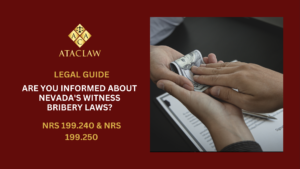Understanding the legal landscape can be tricky, especially when it comes to non-straightforward concepts like Witness Bribery. In Nevada, the statutes NRS 199.240 and NRS 199.250 respectively highlight the illegality of bribing a witness to influence their testimony, and a witness seeking or receiving a bribe to alter their testimony. These actions can have severe consequences, with penalties ranging from 1 to 10 years imprisonment as a category C felony. However, with the right legal advice and strategy, it’s possible to lessen or even dismiss the charges.

What is Witness Bribery and Bribery By a Witness?
The act of bribing a witness encompasses any scenario in which compensation (promised or given) is used as a lever to sway a witness’s narrative during an official event like a trial. The form of this compensation is immaterial—it could be in the guise of cash, assets, or any type of favor. Essentially, this form of bribery aims to tamper with a witness’s testimony to manipulate the court’s findings.
On the flip side, bribery by a witness occurs when an individual called to provide evidence in a legal setting solicits or accepts any form of compensation with the intention of tweaking their testimony. Regardless of the compensation’s form—be it monetary, tangible property, or preferential favors—this action is classified as illegal. Both instances, whether bribing or being bribed as a witness, significantly undermine the justice process and are dealt a heavy hand legally.
How Can You Defend Yourself Against Charges?
In Nevada, witness bribery falls under the category of a specific intent crime. This classification heavily implies that for a conviction to occur, it must be demonstrated beyond reasonable doubt that the accused had a direct intention to sway a witness’s statement.
1. Based on our insights and professional experience, asserting the absence of any intent to influence a witness’s testimony emerges as the most robust defense strategy against these charges. This approach could involve illustrating that the interaction in question was purely benign, with any implications of bribery being a significant misinterpretation of the exchange. A key aspect of this defense hinges on the lack of concrete evidence to conclusively prove malicious intent on the accused’s part. Should this evidence fall short, there’s a strong basis for the dismissal of the charges.
2. Another potential tactic involves the submission of a motion to suppress evidence, especially if it’s believed that such evidence was obtained through an infringement of legal protocols by law enforcement. The success of this motion could lead to the prosecuting authority reconsidering the viability of their case due to the insufficient evidence.
It’s important to note, however, that certain arguments hold no weight in seeking the dismissal of “bribery of a witness” charges. Specifically, these include the defense that the trial or hearing had yet to be scheduled or that the contested testimony would not have been permissible in any case. Such defenses do not address the core issue of intent and, as such, are ineffectual in challenging the charges at hand.
Could Facing Witness Bribery Charges in Nevada Lead to Jail Time or Deportation?
In Nevada, being found guilty of witness bribery is labeled as a category C felony. This serious classification comes with the possibility of facing a prison sentence between one to 10 years. In addition to incarceration, individuals convicted might also face substantial financial penalties, including:
a. A fine of up to $50,000 if found guilty of bribing a witness.
b. A fine reaching up to $10,000 for witnesses who are convicted of accepting a bribe.
Moreover, the repercussions of such a conviction can extend beyond just jail time and fines. The state holds the authority to initiate asset forfeiture procedures, aiming to retrieve any funds or properties that were illicitly exchanged as part of the bribery.
However, hope is not lost. With adept legal representation, there may be a pathway to mitigating these severe consequences. One possible outcome could involve convincing the court to opt for probation in lieu of imprisonment, thus allowing the individual to avoid being placed behind bars.
For individuals who are not U.S. citizens, the stakes are even higher. Witness bribery falls under the banner of aggravated felonies, which carries the risk of deportation. Recognizing the gravity of this situation, our legal experts tirelessly work towards either having charges completely dismissed or significantly reduced to offenses that do not trigger deportation proceedings.
Can I Have My Conviction Sealed?
Yes, you can seal a witness bribery record in Nevada after a waiting period of five years post-case conclusion. In instances of case dismissal without conviction, you can apply to seal the record immediately. It’s vital to follow the correct legal procedures, potentially with a lawyer’s assistance, to clear your public record.
When Does It Become a Federal Crime?
Witness bribery is classified as a federal crime when it pertains to a federal case or influences interstate commerce. Convicted individuals could face up to 15 years in federal prison, and/or fines up to three times the bribe amount. Therefore, immediate legal advice is essential if facing such charges.
For further legal assistance and to discuss your case with an expert, don’t hesitate to contact ATAC LAW.
